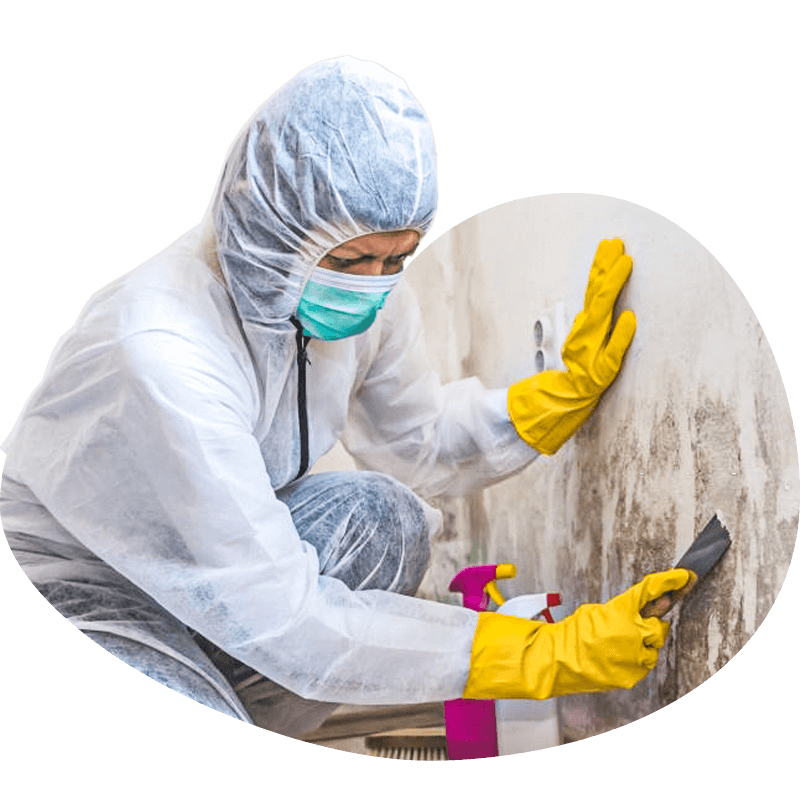
Step 1: Understand the Role of a Mold Remediation Technician
Before diving into a career as a mold remediation technician, it’s important to fully understand what the job entails. Mold remediation technicians are responsible for identifying and removing mold from residential and commercial properties. This includes assessing the extent of mold growth, containing it to prevent further spread, cleaning contaminated areas, and using specialized equipment to ensure the mold is completely removed.
As a technician, you’ll need to be familiar with safety protocols, especially since mold spores can cause health issues if not handled properly. The job often requires physical labor, such as removing moldy materials, operating heavy machinery, and working in tight or confined spaces. It’s also essential to have strong attention to detail, as missing even a small section of mold could lead to it growing back and causing further problems down the line.
Step 2: Obtain the Necessary Certifications
One of the first steps to becoming a mold remediation technician is to obtain the appropriate certifications. Most employers require mold remediation technicians to have professional certification, which ensures that you understand industry best practices and safety protocols.
The most widely recognized certification for mold remediation is offered by the Institute of Inspection, Cleaning, and Restoration Certification (IICRC). The IICRC provides specialized training courses in mold remediation, which cover everything from identifying mold types to using the correct equipment and safety procedures. The IICRC’s Applied Microbial Remediation Technician (AMRT) certification is highly valued by employers and often a requirement for more advanced roles.
Additionally, some states have specific licensing requirements for mold remediation technicians. Be sure to check the regulations in your state, as you may need to pass a state exam or obtain additional certification before you can legally work in the field.

Step 3: Gain Hands-On Experience
While certification is important, hands-on experience is essential for landing a job as a mold remediation technician. Employers often prefer candidates who have some field experience, as this shows that you know how to apply what you’ve learned in real-world situations. Here are some ways to gain experience:
1. Internships and Entry-Level Positions
Many mold remediation companies offer internships or entry-level positions for individuals just starting in the industry. These opportunities allow you to work alongside experienced technicians, learning the ins and outs of mold remediation while gaining valuable hands-on experience. Don’t hesitate to take an entry-level position, as it’s a great way to get your foot in the door and build a foundation for your career.
2. Volunteer for Related Projects
If you’re struggling to find paid positions, consider volunteering for organizations or projects that involve mold remediation or disaster recovery. After floods or natural disasters, many organizations look for volunteers to assist with cleanup efforts, which can give you exposure to mold remediation work. Even though it’s unpaid, this type of experience can be a great addition to your resume and show potential employers that you’re serious about the field.
3. Shadowing a Professional
Another way to gain experience is by shadowing an experienced mold remediation technician. Reach out to local companies or professionals and ask if you can observe their work or assist on a few jobs. This can help you understand the day-to-day responsibilities of a technician and provide networking opportunities for future job openings.
Step 4: Develop Key Skills

In addition to formal training and certifications, there are several key skills that will make you a more competitive candidate when applying for jobs as a mold remediation technician. Here are some of the most important skills to develop:
1. Attention to Detail
As a mold remediation technician, you need to be thorough in your work. Even small amounts of mold left behind can cause regrowth, leading to further damage and health risks for occupants. Developing strong attention to detail will help ensure that you identify all areas of mold growth and follow through on the proper removal and cleaning protocols.
2. Problem-Solving Skills
Mold remediation often involves assessing unique situations and coming up with customized solutions. Technicians must be able to troubleshoot problems, whether it’s figuring out how to access a hard-to-reach area of mold or determining the best method for containment in a challenging environment. Strong problem-solving skills will help you navigate these obstacles effectively.
3. Communication Skills
While much of the job involves physical labor, mold remediation technicians also need to communicate effectively with clients and team members. You may need to explain the mold remediation process to customers, provide updates on the project, or collaborate with other technicians to complete a job. Good communication skills are key to building trust with clients and ensuring that the team works efficiently.
Step 5: Apply for Jobs

Once you’ve obtained certification, gained experience, and developed your skills, it’s time to start applying for jobs. There are several ways to find mold remediation technician positions:
1. Job Boards and Online Listings
Many companies post open positions for mold remediation technicians on job boards like Indeed, Monster, and LinkedIn. Regularly check these sites and apply to any listings that match your qualifications. Be sure to tailor your resume to each job, highlighting your certifications, experience, and relevant skills to stand out from other candidates.
2. Networking
Networking is an effective way to find job opportunities, especially in industries like mold remediation. Attend industry events, join professional organizations like the Restoration Industry Association (RIA), and reach out to local mold remediation companies to introduce yourself and inquire about potential openings. Many jobs in this field are filled through word-of-mouth referrals, so building a network of industry contacts can be invaluable.
3. Contact Local Companies
If you don’t see job listings for mold remediation technicians in your area, consider reaching out directly to local remediation companies. Even if they aren’t actively hiring, they may be open to bringing on a certified technician if they see potential in you. Send a professional resume and cover letter that highlights your certifications, skills, and any relevant experience you’ve gained.
Step 6: Continue Your Education and Advance Your Career
Once you’ve landed a job as a mold remediation technician, it’s important to continue developing your skills and staying up to date with industry standards. Regularly attending training courses, pursuing advanced certifications, and keeping up with new technology in mold remediation will make you a more valuable technician. Over time, you can advance to more senior roles, such as a lead technician, project manager, or even start your own mold remediation business.
Additionally, broadening your skills by obtaining certifications in related areas like water damage restoration or asbestos removal can open up more job opportunities and allow you to take on a wider variety of projects.
FAQ
| Question | Answer |
|---|---|
| Do I need certification to become a mold remediation technician? | Yes, most employers require mold remediation technicians to have professional certifications, such as the IICRC’s AMRT certification. Some states also require specific licensing. |
| How long does it take to become a mold remediation technician? | The time it takes to become a mold remediation technician depends on how quickly you complete your certifications and gain hands-on experience. Most certifications can be completed in a few weeks to a few months. |
| Is mold remediation a physically demanding job? | Yes, mold remediation often involves physical labor, including removing moldy materials, using heavy equipment, and working in confined spaces. Being physically fit can help you succeed in this role. |
| How much can I expect to earn as a mold remediation technician? | Salaries vary depending on location and experience, but the average mold remediation technician can expect to earn between $35,000 and $50,000 per year. Experienced technicians and those in management roles can earn more. |
| What are the career advancement opportunities in mold remediation? | With experience, you can advance to senior technician, project manager, or even start your own mold remediation business. Additional certifications in areas like water damage restoration can also expand your career options. |
If you’re interested in starting your career in mold remediation or need help with mold issues in your home, contact Citywide Mold Mitigation for expert advice and services.

